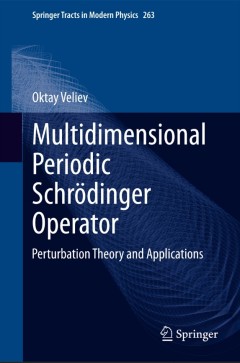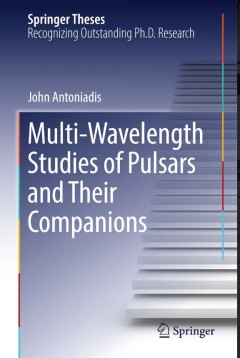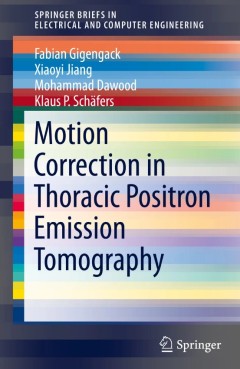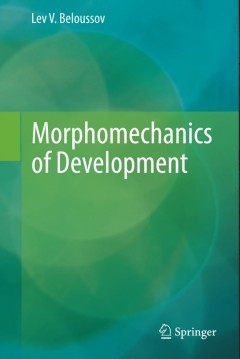Filter by

Natural Compounds as Therapeutic Agents for Amyloidogenic Diseases
This edited volume concerns a group of devastating neurological disorders that share a common pathological mechanism, namely the aggregation and deposition of insoluble, proteinaceous lesions, termed ‘amyloid’. Examples of cerebral amyloid disorders include common neurodegenerative diseases like Alzheimer’s disease-related dementia and Parkinson’s disease, as well as other less prevalen…
- Edition
- 1
- ISBN/ISSN
- 978-3-319-18364-0
- Collation
- VII, 163
- Series Title
- Advances in Experimental Medicine and Biology
- Call Number
- -

Multidimensional Periodic Schrödinger Operator:Perturbation Theory and Appli…
The book describes the direct problems and the inverse problem of the multidimensional Schrödinger operator with a periodic potential. This concerns perturbation theory and constructive determination of the spectral invariants and finding the periodic potential from the given Bloch eigenvalues. The unique method of this book derives the asymptotic formulas for Bloch eigenvalues and Bloch funct…
- Edition
- 1
- ISBN/ISSN
- 978-3-319-38671-3
- Collation
- X, 242
- Series Title
- Springer Tracts in Modern Physics
- Call Number
- -

Multi-Wavelength Studies of Pulsars and Their Companions
The focus of his prize-winning thesis is on observations and modeling of binary millisecond pulsars. But in addition, John Antoniadis covers a wide range of observational measurements of binary compact stars systems and tests of General Relativity, like indirect measurements of gravitational wave emission and posing the most stringent constraints on Scalar-Tensor gravity theories. Among others,…
- Edition
- 1
- ISBN/ISSN
- 2190-5053
- Collation
- XXI, 83
- Series Title
- Springer Theses
- Call Number
- -

Multi-Targeted Approach to Treatment of Cancer
In this book, clinicians and basic scientists from USA, India, and other countries discuss the rationales and clinical experiences with targeted approaches to treat, prevent, or manage cancer. Cancer is a hyperproliferative disorder that is regulated by multiple genes and multiple cell signaling pathways. Genomics, proteomics, and metabolomics have revealed that dysregulation of dozens of genes…
- Edition
- 1
- ISBN/ISSN
- 978-3-319-35768-3
- Collation
- XIV, 410
- Series Title
- -
- Call Number
- -

Molecular and Cellular Mechanobiology
This book will cover the cutting-edge developments in molecular and cellular mechanobiology to date. Readers will have a clear understanding of mechanobiology at the molecular and cellular levels, encompassing the mechanosensors, transducers, and transcription. An integrative approach across different scales from molecular sensing to mechanotransduction and gene modulation for physiological reg…
- Edition
- 1
- ISBN/ISSN
- 978-1-4939-5615-9
- Collation
- XIII, 302
- Series Title
- Physiology in Health and Disease
- Call Number
- -

Molecular and Cellular Biology of Platelet Formation
This book gives a comprehensive insight into platelet biogenesis, platelet signal transduction, involvement of platelets in disease, the use of diverse animal models for platelet research and future perspectives in regard to platelet production and gene therapy. Being written by international experts, the book is a concise state-of-the art work in the field of platelet biogenesis, biology and r…
- Edition
- 1
- ISBN/ISSN
- 978-3-319-39560-9
- Collation
- X, 460
- Series Title
- -
- Call Number
- -

Motion Correction in Thoracic Positron Emission Tomography
Respiratory and cardiac motion leads to image degradation in Positron Emission Tomography (PET), which impairs quantification. In this book, the authors present approaches to motion estimation and motion correction in thoracic PET. The approaches for motion estimation are based on dual gating and mass-preserving image registration (VAMPIRE) and mass-preserving optical flow (MPOF). With mass-pre…
- Edition
- 1
- ISBN/ISSN
- 978-3-319-08391-9
- Collation
- XI, 88
- Series Title
- SpringerBriefs in Electrical and Computer Engineering
- Call Number
- -

Molecular Structures and Structural Dynamics of Prion Proteins and Prions
This monograph is the first easy-to-read-and-understand book on prion proteins' molecular dynamics (MD) simulations and on prions' molecular modelling (MM) constructions. It enables researchers to see what is crucial to the conformational change from normal cellular prion protein (PrPC) to diseased infectious prions (PrPSc), using MD and MM techniques. As we all know, prion diseases, caused by…
- Edition
- 1
- ISBN/ISSN
- 978-94-017-7317-1
- Collation
- XIX, 355
- Series Title
- Focus on Structural Biology
- Call Number
- -

Molecular Physiology and Ecophysiology of Sulfur
This proceedings volume contains a selection of invited and contributed papers of the 9th International Workshop on Sulfur Metabolism in Plants, which was hosted by Heinz Rennenberg, Albert-Ludwigs-University Freiburg and was held at Schloss Reinach, Freiburg-Munzigen, Germany from April 14-17, 2014. The focus of this workshop was on molecular physiology and ecophysiology of sulfur in plants an…
- Edition
- 1
- ISBN/ISSN
- 978-3-319-20136-8
- Collation
- XIII, 265
- Series Title
- Proceedings of the International Plant Sulfur Workshop
- Call Number
- -

Morphomechanics of Development
This book outlines a unified theory of embryonic development, assuming morphogenesis to be a multi-level process including self-organizing steps while also obeying general laws. It is shown how molecular mechanisms generate mechanical forces, which in the long run lead to morphological changes. Questions such as how stress-mediated feedback acts at the cellular and supra-cellular levels and ho…
- Edition
- 1
- ISBN/ISSN
- 978-3-319-35365-4
- Collation
- -
- Series Title
- -
- Call Number
- -
 Computer Science, Information & General Works
Computer Science, Information & General Works  Philosophy & Psychology
Philosophy & Psychology  Religion
Religion  Social Sciences
Social Sciences  Language
Language  Pure Science
Pure Science  Applied Sciences
Applied Sciences  Art & Recreation
Art & Recreation  Literature
Literature  History & Geography
History & Geography